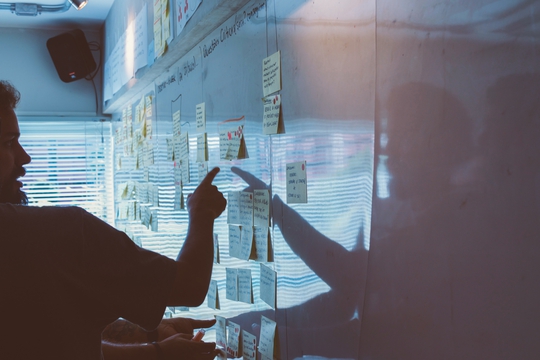Appendix I: Reflection on methods
by
Notes from Below (@NotesFrom_Below)
November 21, 2022
Featured in The Class Composition Project (#16)
Reflection on the methods used for the Class Composition Project

inquiry
Appendix I: Reflection on methods
by
Notes from Below
/
Nov. 21, 2022
in
The Class Composition Project
(#16)
Reflection on the methods used for the Class Composition Project
What we did
We launched the Class Composition project with an introduction (included earlier) and a mailing list to collect interest. The project officially launched with an open meeting on the 30th of January 2021. We intended to keep the scope and methods open at this early stage. The meeting covered an introduction to the project (which was recorded), breakout groups to get to know participants and discuss the project, and a presentation on some suggested next practical steps.
One of the main practical suggestions was to establish a forum that could be used to keep in touch, discuss ideas, and work through the project between meetings. We also held a first planning meeting on the 13th of February, with a proposal to alternate between ‘planning meetings’ and ‘presentation’ meetings every two weeks. The overall aim was to use these meetings to start collectively mapping out class composition in Britain, producing written reports that we can compile and share. These don’t have to be dry reports, but build on workers’ perspectives and details of struggles as well as mapping the sectors.
In the first of these meetings, we discussed the general need to reach out to more workers in our different sectors, move towards drawing up general overviews of our respective sectors, and identifying key workplaces where more focussed inquiries might be possible. Overall, we agreed that we are aiming to publish a collection of our initial written findings in a year’s time. We had a chat about three sectors: IT, retail, and claimants that some of the participants want to focus on. It was agreed that Laura would give a general introduction to the data sources she uses, and explain how the different groups can use them most effectively. She asked people to share what they would find most useful for her to focus on, so she can tailor her presentation around that. We agreed to take out a subscription to Survey Monkey, an online survey tool that everybody in the project can use.
In the next meeting on the 27th of February, we focused on ‘Data and Class Composition.’’ It focused on how we can use data for mapping class composition. There was a presentation on what data is available and how it could be used, followed by a discussion about how we could do this in different sectors for the project.
On the 9th of March, we launched the Class Composition Survey. The survey questions are included in Appendix II. We had a first meeting to discuss using and sharing the survey on the 13th of March. We set ourselves the bold target of mapping out work across the whole of Britain, using a combination of data, surveys and interviews with workers, with the ultimate aim of providing useful tools to help workers organise. We were trying to take an industry-level approach, with workers setting up groups to cover their industry as they join the project.
We then moved to a different schedule for the Class Composition Project, meeting on the 4th Saturday of each month. These meetings aimed to have updates about how the survey is going, as well as progress from different sectors. The first was on the 27th of March. It discussed how surveys have been used successfully to kickstart organising at work, updates on the project so far, report back from the tech sector group, and next steps.
On the 24th of April, our next meeting covered the survey so far, with sector working groups set up in education, health and tech work. We heard updates from these three sectors, and made plans for a Class Composition social media storm on International Workers Day.
For International Workers Day, we held a ‘day of action’ on the survey. This meant getting people involved to systematically share with friends, colleagues, through their networks, and on social media.
On the 18th of May, we held the next open organising meeting. We discussed the way employers across the country use many sources of information to plan how they manage their employees to maximise profits at any cost. However, any time employment is discussed in the mainstream media, it is from the point of view of bosses. We wanted the Class Composition Project to be for workers to share information, discuss and learn lessons, to have the best chance to fight. After two months of meetings, three sector working groups and more than two hundred survey responses, the project was growing. We established two working groups. First, a Comms working group to keep promoting the survey. Second, an interview group. At this point, we had around a hundred survey respondents who wanted to be interviewed to discuss their experience at work in more detail. Some in the group had already conducted interviews, provided guides, and can assist with coaching. We also sent a message of solidarity to the general strike in Palestine, and published an interview with Riya Al’Sanah on Notes from Below.
As the Class Composition Project has progressed, we saw themes emerge of common experiences from survey responses, interviews and struggles that we have been supporting or involved in. These themes can affect workers across different sectors in varied ways. For instance, freelancing in one workplace can be extremely lucrative for workers, while in another it is a method of extreme exploitation. These topics are rarely discussed in the mainstream press, and if they are usually from the perspective of employers. Drawing insight from workers’ experiences is central to the aims of the Class Composition Project, so we will be using themed discussions to explore them more fully. We maintained a list of the topics that workers can vote for. You can vote to participate as someone who has had direct experience of the issue being discussed, or as someone who is interested but has not been directly affected. We will continue to update the list as more themes emerge from the project, but an initial list was published as a survey that can be voted on.
The next open meeting was on the 15th of June. We discussed the insights from interviews, surveys and annoying discussions in the working groups. We launched the Arts and Culture Sector Working group, following an increase in participants to the survey. A ‘Sharing the Survey’ guide was put together for the website, including links to share on different social media platforms and suggested text. We prompted the workers campaign to prevent the McVities factory closure in Glasgow’s East end. We continued to support the Goodlord workers campaign to fight fire-and-rehire.[^1] Members of the project visited the picket lines and supported the campaign. In addition to the ongoing strike action, union activists have also protested at letting agencies who are current customers of Goodlord, distributing leaflets asking for them to assist in getting Goodlord to roll back the action.
On the 28th of June we held another open organising meeting. It covered the Worker Writing Fund, an approach to the Charities sector, an update from the Interviews Working Group, and planning a social. The Unite General Secretary election then became a focus, as Unite members all over the country have received the statements and nominations of the three candidates standing in the election of General Secretary - Steve Turner, Gerard Coyne, and Sharon Graham. Len McCluskey’s backing of Steve, as the candidate standing on the United Left platform in opposition to Gerard, was no surprise - especially as Steve has held the post of Assistant General Secretary for some years as Len’s ally. However, both Len and Steve have faced criticism from rank and file membership for not tackling critical issues facing the union. Ray, a participant in the project, has written an article that digs deeper into the difficulties for the left of the union and what kind of change is needed.
As we had passed the half-way point of the project, we then started a first round of analysis on the data from the more than 250 initial survey respondents. The data has been anonymised and triaged according to which sector the respondents are working in. This meant the four sector working groups set up so far could start analysing the responses to the survey that have been submitted up to this point. This could then inform what next steps we take both in the working groups and across the project as a whole. The working groups were: education, tech, arts and culture, and health. We then held another open meeting on the 27th of July to introduce and discuss this. This was followed by a social on the 31st of July. Optimistically the social was planned to be a picnic, but we had to move to a pub nearby due to the British summer weather.
On the 24th of August, we held an open organising. It focused on one of the initial findings: Only 53% of workers agree that staff are treated with respect in their workplace, but only 25% agree that staff are able to influence company decisions, according to our analysis of the first 250 responses to the Class Composition Project workplace survey. We discussed the full results of the first look at the survey responses and shaped the direction and key areas of focus for the remaining 4 months of the project. We also prompted the launch of the IWGB Branch for General Members and their face-to-face leafleting and organising on Brick Lane in London on the 27th of August.
The next open organising meeting on the 7th of September tried to get people involved after returning from holidays. We discussed outcomes and timelines, survey outreach, and sector working groups.
In October, the Education Working Group put together a call-out. It includes a summary of the activities the group has been engaged in so far and their findings. The call-out was primarily to invite other workers and organisers to write, share and reflect on their own workplaces and organisations. This could be done through contributing short or long reflection pieces, or participating in the national workshop the working group has organised for 27th November, which was attended by around a dozen militants working in the education sector. Whether you are in the Education sector or not, we invited people to read the call-out to get a flavour of some of the discussions that have been happening so far in the project. If people were working in the Education sector, they were invited to get in touch to be a part of the discussions and to shape the findings of the project. We then held an open organising meeting for the project on the 19th of October.
Next, we held a meeting on the 2nd of November and another social event on the 6th of November. We then hosted a panel at the Historical Materialism conference on the 7th of November - which was recorded. We also planned to end collecting responses to the survey on the 20th of November. We also decided to suspend the online forum.
We held two final meetings for the project. First, a meeting on the 15th of January 2022 specifically to discuss the data side of the class composition project. We invited people with data analytics skills to help us think through how we make the most of the data we have gathered as part of the project. Second, an open meeting for the project on the 29th of January to present the data so far, feedback from the sector groups, and plan the next steps of the project as we move into the next stage of the project.
The next six months involved writing up the project - both collectively and as individuals - as well as catching up on changes in class composition that continue to unfold.
Featured in The Class Composition Project (#16)
author
Notes from Below (@NotesFrom_Below)
Subscribe to Notes from Below
Subscribe now to Notes from Below, and get our print issues sent to your front door three times a year. For every subscriber, we’re also able to print a load of free copies to hand out in workplaces, neighbourhoods, prisons and picket lines. Can you subscribe now and support us in spreading Marxist ideas in the workplace?
Read next

Conclusions and next steps for the Class Composition Project
by
Notes from Below
/
March 21, 2023

